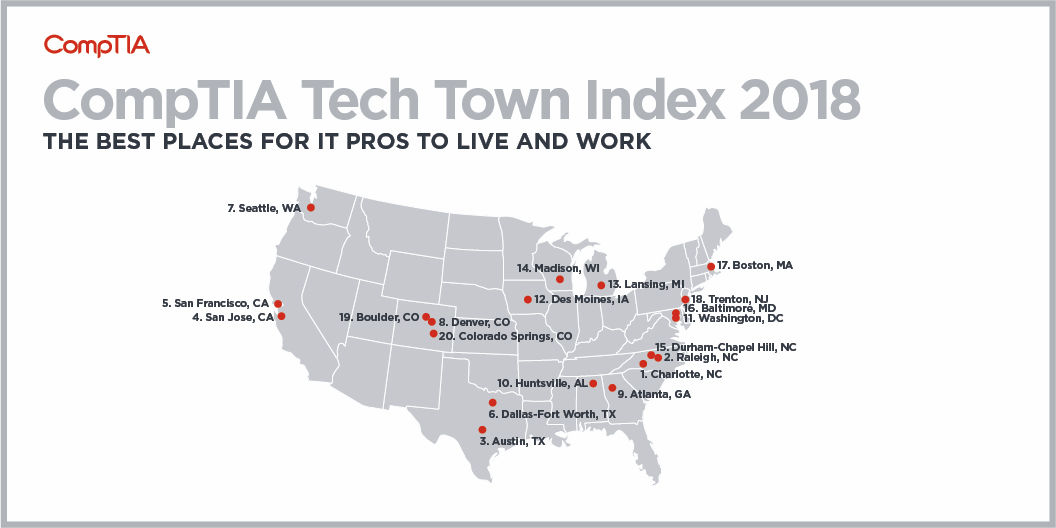The Fastest-Growing Cities for Web Developers
Last Updated: June 6th 2024

When people think about web development, many think of Silicon Valley’s tech giants. If you’re an aspiring coder, you may be considering a move to this area given the density of tech companies and coding jobs.
But despite its popularity, challenges exist for many web developers that call this area home. As a result, there has been a rise in tech employment outside of this region in smaller U.S. cities.
Let’s take a look at this trend, why it’s happening, and what cities are growing.
The Silicon Valley problem
It’s no secret that Silicon Valley is one of the most expensive areas to live in the U.S. And although tech salaries in this area are still rising - Forbes reported a 2 percent increase in salary levels in 2018 - many Silicon Valley tech professionals feel that the cost of living is rising faster, making them feel underpaid.
This is causing many to move to smaller cities, where living costs are cheaper. Some of these cities have also seen drastic rises in tech salaries recently. For example, Forbes reported a 9 percent salary increase for web developers in Boston last year, with Austin and Washington, D.C. at 6 percent.
An increase in remote work, as well as remote learning opportunities, are also causing some tech employees to prioritize location less. In fact, even coding bootcamps are beginning to be less solely focused in major U.S. cities. For example, Nucamp allows students to complete their coursework remotely along with once-weekly, in-person workshops that are arranged close to their location. This is ideal for aspiring coders in smaller cities or rural areas.

Where tech professionals are moving
To measure this, researchers are considering a few different aspects. Average salary and cost of living are of course among them, but things like transportation also come into play when considering overall quality of life. The list below is combined from reports from ZipRecruiter and TechBeacon:
- Austin, TX
- Raleigh, NC
- Provo, UT
- Fort Collins, CO
- Hartford, CT
- Indianapolis, IN
- Boise, ID
- Manchester, NH
- Nashville, TN
- Eugene, OR
- Boston, MA
- Phoenix, AZ
- Atlanta, GA
- Dallas-Fort Worth, TX
Thinking about a move? Here’s what to consider
Similar to how the research above considers many factors, so should your decision about where to move. Based on this data, here are a few things to consider.
- Average tech salary and percent increase in salary by city: It’s probably the most obvious factor, but it’s a good place to start. Getting a sense of where the most highly-paid web developers live can give you an idea of where the tech hot spots are. But, in addition to that, also look at the percent increase in salary year-to-year by city; you’re likely to see some big changes on that list. Although Silicon Valley has some of the highest-paid developers in the country, the area hasn’t seen as high of salary percentage increases recently as other cities.
- Cost of living: Your salary, though, is impacted by the amount you’ll pay in living costs. Here, again, you’ll see areas like Silicon Valley topping the list. So although this is one of the highest-paying regions for tech, remember the amount of money that’s going towards living costs in comparison to this ratio in other cities.
- Number of open tech roles: Another useful metric is seeing how many open tech jobs exist in a given city. Websites like ZipRecruiter can tell you how many job listings it has for a given job title by city. This is helpful in understanding how competitive the job market will be. If possible, some reports might shed light on this data over time; for example this report by TechBeacon breaks down the tech and STEM growth index, measuring the growth of these industries not just in-the-moment, but over a longer period of time. This is more useful in seeing patterns and predicting which cities are likely to become the most popular.
- Transportation and commute time: Work isn’t just about the time you spend at a job - it also includes the amount of time you spend getting there (and getting home). The TechBeacon report also calls out cities with strong transit systems - useful for those who don’t want to rely on a car to get to work everyday. Other analyses, such as traffic volume reports, can be useful for considering commute times in cities where cars are a must-have.
READY TO SEE IF CODING IS RIGHT FOR YOU?
Come check out the nearest community coding bootcamp in your city or town. Click here to get started.
Chevas Balloun
Director of Marketing & Brand
Chevas has spent over 15 years inventing brands, designing interfaces, and driving engagement for companies like Microsoft. He is a practiced writer, a productivity app inventor, board game designer, and has a builder-mentality drives entrepreneurship.


